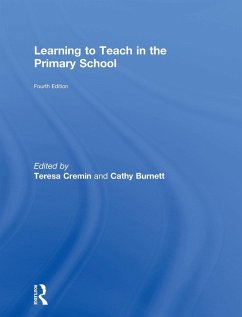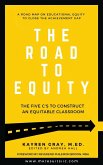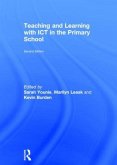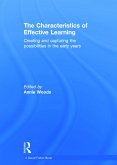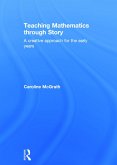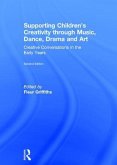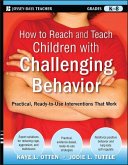Learning to Teach in the Primary School
Herausgeber: Cremin, Teresa; Burnett, Cathy
Learning to Teach in the Primary School
Herausgeber: Cremin, Teresa; Burnett, Cathy
- Gebundenes Buch
- Merkliste
- Auf die Merkliste
- Bewerten Bewerten
- Teilen
- Produkt teilen
- Produkterinnerung
- Produkterinnerung
The 4th edition of this bestselling textbook has been fully updated with the latest research and initiatives in the field, as well as the most recent changes to the National Curriculum. With ten brand new units, including tackling SPAG, the creative curriculum, teaching for mastery and teaching in the current climate, there is even more practical advice and guidance for trainees. A selection of extra tasks have been woven throughout, with an emphasis on innovative and reflective practice, and new 'vivid examples' bring each chapter's argument alive in a classroom context. This accessible and…mehr
Andere Kunden interessierten sich auch für
![The Road To Equity The Road To Equity]() Kayren GrayThe Road To Equity24,99 €
Kayren GrayThe Road To Equity24,99 €![Teaching and Learning with ICT in the Primary School Teaching and Learning with ICT in the Primary School]() Teaching and Learning with ICT in the Primary School166,99 €
Teaching and Learning with ICT in the Primary School166,99 €![The Characteristics of Effective Learning The Characteristics of Effective Learning]() The Characteristics of Effective Learning176,99 €
The Characteristics of Effective Learning176,99 €![Literature in the Elementary School Literature in the Elementary School]() Porter Lander MacclintockLiterature in the Elementary School28,99 €
Porter Lander MacclintockLiterature in the Elementary School28,99 €![Teaching Mathematics Through Story Teaching Mathematics Through Story]() Caroline McgrathTeaching Mathematics Through Story176,99 €
Caroline McgrathTeaching Mathematics Through Story176,99 €![Supporting Children's Creativity Through Music, Dance, Drama and Art Supporting Children's Creativity Through Music, Dance, Drama and Art]() Supporting Children's Creativity Through Music, Dance, Drama and Art194,99 €
Supporting Children's Creativity Through Music, Dance, Drama and Art194,99 €![How to Reach and Teach Children with Challenging Behavior (K-8) How to Reach and Teach Children with Challenging Behavior (K-8)]() Kaye OttenHow to Reach and Teach Children with Challenging Behavior (K-8)25,99 €
Kaye OttenHow to Reach and Teach Children with Challenging Behavior (K-8)25,99 €-
-
-
The 4th edition of this bestselling textbook has been fully updated with the latest research and initiatives in the field, as well as the most recent changes to the National Curriculum. With ten brand new units, including tackling SPAG, the creative curriculum, teaching for mastery and teaching in the current climate, there is even more practical advice and guidance for trainees. A selection of extra tasks have been woven throughout, with an emphasis on innovative and reflective practice, and new 'vivid examples' bring each chapter's argument alive in a classroom context. This accessible and engaging textbook is essential reading for all students training to be primary school teachers.
Produktdetails
- Produktdetails
- Verlag: Taylor & Francis
- 4th edition
- Seitenzahl: 576
- Erscheinungstermin: 21. März 2018
- Englisch
- Abmessung: 260mm x 208mm x 37mm
- Gewicht: 1516g
- ISBN-13: 9781138211049
- ISBN-10: 1138211044
- Artikelnr.: 52011858
- Herstellerkennzeichnung
- Libri GmbH
- Europaallee 1
- 36244 Bad Hersfeld
- gpsr@libri.de
- Verlag: Taylor & Francis
- 4th edition
- Seitenzahl: 576
- Erscheinungstermin: 21. März 2018
- Englisch
- Abmessung: 260mm x 208mm x 37mm
- Gewicht: 1516g
- ISBN-13: 9781138211049
- ISBN-10: 1138211044
- Artikelnr.: 52011858
- Herstellerkennzeichnung
- Libri GmbH
- Europaallee 1
- 36244 Bad Hersfeld
- gpsr@libri.de
Teresa Cremin is Professor of Education (Literacy) at The Open University, UK. A former primary teacher and teacher educator, she has served as President of the UK Reading Association and the UKLA, and Board member of the Cambridge Primary Review Trust, BookTrust and the Poetry Archive. She has led and contributed to a number of projects on creativity and on teachers' literate identities and practices and has published widely in these areas (https://researchrichpedagogies.org/research/). Cathy Burnett is Professor of Literacy and Education at Sheffield Hallam University, UK where she leads the Language and Literacy Education Research Group. She worked for many years as a primary teacher and teacher educator and is currently Vice President for the UKLA. She has published widely for professional and academic readerships and has led and contributed to research projects associated with literacy, digital media, teacher identities, and uses of new technologies in classrooms.
Introduction Section 1: Becoming a Teacher 1.1. Primary teaching: a
personal perspective 1.2. Becoming a professional in the current context
1.3. Making the most of your placements Section 2: Exploring the Nature of
Learning and Teaching 2.1. Looking at children 2.2. Looking at learning
6. From learning to teaching 2.3. Moving from novice towards expert teacher
2.4. Building on firm foundations: Early years practice 2.5. The importance
of play and explorative learning Section 3: Planning and Managing Learning
3.1. Building inclusive communities of engaged learners 3.2. Approaching
Short-term planning 3.3. Organising your classroom for learning 3.4.
Managing classroom behaviour 3.5. Handling difficulties in social,
emotional and behaviour development 3.6. Organising effective classroom
talk 3.7. The value of outdoor learning Section 4: Approaches to the
Curriculum 4.1. Investigating the aims, values and purposes of primary
education: the case of the Cambridge Primary Review 4.2. Aims into
practice: Understanding schools' aims and enacting your own 4.3. Critical
perspectives on the curriculum Section 5: Assessment 5.1 Assessment for
learning: Formative approaches 5.2 Assessment for learning: Summative
approaches Section 6: Diversity and Inclusion 6.1 Providing for
differentiation 6.2 Special educational needs and inclusion 6.3 Teaching
for social justice: Creating equity for pupils living in poverty and those
from black minority ethnic backgrounds 6.4 Responding to cultural diversity
and citizenship 6.5 Responding to linguistic diversity 6.6 Responding to
gender differences Section 7: Recent Developments 7.1 Engaging with pupils:
Listening to the voices of children and young people 7.2 Reading: marrying
word recognition with comprehension and pleasure 7.3 The creative and the
critical: Grammar and punctuation 7.4 Creativity and creative teaching and
learning 7.5 Thinking skills 7.6 Understanding mastery in primary
mathematics 7.7 Primary education in a digital age Section 8: Partnership
in Practice 8.1 Working with teaching assistants 8.2 Partnerships with
parents 8.3 Understanding the teacher's pastoral role Section 9: Your
Professional Development 9.1 Applying for jobs and preparing for your
induction year 9.2 Understanding and planning your continuing professional
development 9.3 Research and professional development: using research and
enquiry to develop as a teacher
personal perspective 1.2. Becoming a professional in the current context
1.3. Making the most of your placements Section 2: Exploring the Nature of
Learning and Teaching 2.1. Looking at children 2.2. Looking at learning
6. From learning to teaching 2.3. Moving from novice towards expert teacher
2.4. Building on firm foundations: Early years practice 2.5. The importance
of play and explorative learning Section 3: Planning and Managing Learning
3.1. Building inclusive communities of engaged learners 3.2. Approaching
Short-term planning 3.3. Organising your classroom for learning 3.4.
Managing classroom behaviour 3.5. Handling difficulties in social,
emotional and behaviour development 3.6. Organising effective classroom
talk 3.7. The value of outdoor learning Section 4: Approaches to the
Curriculum 4.1. Investigating the aims, values and purposes of primary
education: the case of the Cambridge Primary Review 4.2. Aims into
practice: Understanding schools' aims and enacting your own 4.3. Critical
perspectives on the curriculum Section 5: Assessment 5.1 Assessment for
learning: Formative approaches 5.2 Assessment for learning: Summative
approaches Section 6: Diversity and Inclusion 6.1 Providing for
differentiation 6.2 Special educational needs and inclusion 6.3 Teaching
for social justice: Creating equity for pupils living in poverty and those
from black minority ethnic backgrounds 6.4 Responding to cultural diversity
and citizenship 6.5 Responding to linguistic diversity 6.6 Responding to
gender differences Section 7: Recent Developments 7.1 Engaging with pupils:
Listening to the voices of children and young people 7.2 Reading: marrying
word recognition with comprehension and pleasure 7.3 The creative and the
critical: Grammar and punctuation 7.4 Creativity and creative teaching and
learning 7.5 Thinking skills 7.6 Understanding mastery in primary
mathematics 7.7 Primary education in a digital age Section 8: Partnership
in Practice 8.1 Working with teaching assistants 8.2 Partnerships with
parents 8.3 Understanding the teacher's pastoral role Section 9: Your
Professional Development 9.1 Applying for jobs and preparing for your
induction year 9.2 Understanding and planning your continuing professional
development 9.3 Research and professional development: using research and
enquiry to develop as a teacher
Introduction Section 1: Becoming a Teacher 1.1. Primary teaching: a
personal perspective 1.2. Becoming a professional in the current context
1.3. Making the most of your placements Section 2: Exploring the Nature of
Learning and Teaching 2.1. Looking at children 2.2. Looking at learning
6. From learning to teaching 2.3. Moving from novice towards expert teacher
2.4. Building on firm foundations: Early years practice 2.5. The importance
of play and explorative learning Section 3: Planning and Managing Learning
3.1. Building inclusive communities of engaged learners 3.2. Approaching
Short-term planning 3.3. Organising your classroom for learning 3.4.
Managing classroom behaviour 3.5. Handling difficulties in social,
emotional and behaviour development 3.6. Organising effective classroom
talk 3.7. The value of outdoor learning Section 4: Approaches to the
Curriculum 4.1. Investigating the aims, values and purposes of primary
education: the case of the Cambridge Primary Review 4.2. Aims into
practice: Understanding schools' aims and enacting your own 4.3. Critical
perspectives on the curriculum Section 5: Assessment 5.1 Assessment for
learning: Formative approaches 5.2 Assessment for learning: Summative
approaches Section 6: Diversity and Inclusion 6.1 Providing for
differentiation 6.2 Special educational needs and inclusion 6.3 Teaching
for social justice: Creating equity for pupils living in poverty and those
from black minority ethnic backgrounds 6.4 Responding to cultural diversity
and citizenship 6.5 Responding to linguistic diversity 6.6 Responding to
gender differences Section 7: Recent Developments 7.1 Engaging with pupils:
Listening to the voices of children and young people 7.2 Reading: marrying
word recognition with comprehension and pleasure 7.3 The creative and the
critical: Grammar and punctuation 7.4 Creativity and creative teaching and
learning 7.5 Thinking skills 7.6 Understanding mastery in primary
mathematics 7.7 Primary education in a digital age Section 8: Partnership
in Practice 8.1 Working with teaching assistants 8.2 Partnerships with
parents 8.3 Understanding the teacher's pastoral role Section 9: Your
Professional Development 9.1 Applying for jobs and preparing for your
induction year 9.2 Understanding and planning your continuing professional
development 9.3 Research and professional development: using research and
enquiry to develop as a teacher
personal perspective 1.2. Becoming a professional in the current context
1.3. Making the most of your placements Section 2: Exploring the Nature of
Learning and Teaching 2.1. Looking at children 2.2. Looking at learning
6. From learning to teaching 2.3. Moving from novice towards expert teacher
2.4. Building on firm foundations: Early years practice 2.5. The importance
of play and explorative learning Section 3: Planning and Managing Learning
3.1. Building inclusive communities of engaged learners 3.2. Approaching
Short-term planning 3.3. Organising your classroom for learning 3.4.
Managing classroom behaviour 3.5. Handling difficulties in social,
emotional and behaviour development 3.6. Organising effective classroom
talk 3.7. The value of outdoor learning Section 4: Approaches to the
Curriculum 4.1. Investigating the aims, values and purposes of primary
education: the case of the Cambridge Primary Review 4.2. Aims into
practice: Understanding schools' aims and enacting your own 4.3. Critical
perspectives on the curriculum Section 5: Assessment 5.1 Assessment for
learning: Formative approaches 5.2 Assessment for learning: Summative
approaches Section 6: Diversity and Inclusion 6.1 Providing for
differentiation 6.2 Special educational needs and inclusion 6.3 Teaching
for social justice: Creating equity for pupils living in poverty and those
from black minority ethnic backgrounds 6.4 Responding to cultural diversity
and citizenship 6.5 Responding to linguistic diversity 6.6 Responding to
gender differences Section 7: Recent Developments 7.1 Engaging with pupils:
Listening to the voices of children and young people 7.2 Reading: marrying
word recognition with comprehension and pleasure 7.3 The creative and the
critical: Grammar and punctuation 7.4 Creativity and creative teaching and
learning 7.5 Thinking skills 7.6 Understanding mastery in primary
mathematics 7.7 Primary education in a digital age Section 8: Partnership
in Practice 8.1 Working with teaching assistants 8.2 Partnerships with
parents 8.3 Understanding the teacher's pastoral role Section 9: Your
Professional Development 9.1 Applying for jobs and preparing for your
induction year 9.2 Understanding and planning your continuing professional
development 9.3 Research and professional development: using research and
enquiry to develop as a teacher

